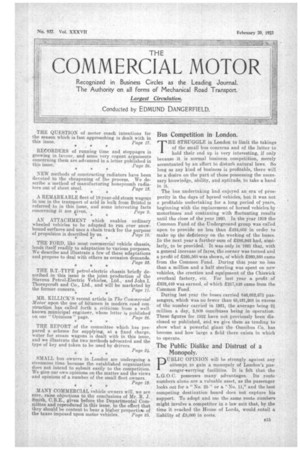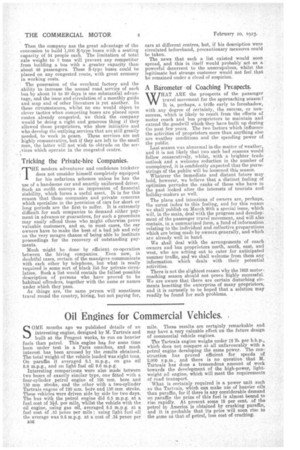Bus Competition in London.
Page 1

Page 2

If you've noticed an error in this article please click here to report it so we can fix it.
THE STRUGGLE in London to limit the takings of the small bus concerns and of the latter to hold their end up is very interesting, if only because it is normal business competition, merely accentuated by an effort to disturb natural laws. So long as any kind of business is profitable, there will be a desire on the part of those possessing the necessary knowledge, ability, and aptitude, to take a hand in it.
The bus undertaking had enjoyed an era of prosperity in the days of horsed vehicles, but it was not a profitable undertaking for a long period of years, beginning with the replacement of horsed vehicles by motorbuses and continuing with fluctuating results until the close of the year 1920. In the year 1919 the Common Fund of the Underground group was called upon to provide no less than 2424,003 in order to make up the deficiency on the working of the buses. In the next year a further sum of 2286,942 had, similarly, to be provided. It was only in 1921 that, with a general increase of fares, the corner was turned and a profit of 2595,566 svas shown, of which 2260,568 came from the Common Fund. During that year no less than a million and a half sterling was spent on new vehicles, the erection and equipment of the Chiswick overhaul factory, etc. For last year a profit of £639,449 was earned, Of which .:£257,449 came from the Common Fund. .
During last year the buses carried 646,682,673 passengers, which was no fewer than 85,431,268 in excess of the number carried in 1921, the average being 24j million a day, 2,809 omnibuses being in operation. These figures for 1922 have not previously been disclosed or published, and we give them as tending to show what a powerful giant the Omnibus Co. has become and how large a field there exists in which to operate.
The Public Dislike and Distrust of a Monopoly.
UBLIC OPINION will be strongly against any attempt to gain a monopoly of London's pas senger-sarrying facilities. It is felt that the L.G.O.C. possesses many advantages. Its route. numbers alone are a valuable asset, as the passenger looks out for a " No. 25-" or a "No. 11," and the best competing destination board does not capture his support. To adopt and use the same route numbers might involve a competitor in a law suit that, by the time it reached the House of Lords, would entail a liability of 25,000 in costs. Then the company nas the great advantage of the concession to build 1,000 4-type buses with a seating capacity of 54 people each. The limitation of total axle weight to 8 tons will prevent any competitor from building a bus with a greater capacity than about 46 passengers. These Stype buses could be placed on any congested route, with great economy in working costs.
The possession of the overhaul factory and the ability to increase the annual road service of each bus by about 14 to 20 days is one substantial advantage, and the issue and circulation of a monthly guide and map and of other literature is yet another. In these circumstances, whilst no one would object to clever tactics when competing buses are placed upon routes already congested, we think the company would be doing a right and generous thing if they allowed those proprietors, who show initiative and who develop the outlying services that are still greatly needed, to work in peace. These services are not highly remunerative, but if they are left to the small men, the latter will not wish to obtrude on the ser,vices which operate in the congested centre.
Tricking the Private-hire Companies.
HE modern adventurer and confidence trickster does not consider himself completely equipped for his nefarious schemes unless he has the use of a handsome car and smartly uniformed driver. Such an outfit conveys an impression of financial stability, which forms a useful asset. It is for this reason that those companies and private concerns which specialize in the provision of ears for short or long periods are the first to suffer. It is extremely difficult for such companies to demand either payment in advance or guarantees, for such a procedure may easily offend those who might otherwise prove valuable customers, and so, in most cases, the car owners have to make the best of a bad job and rely on the very meagre chance of being able to institute proceedings for the recovery of outstanding payments.
Much might be done by efficient co-operation between the hiring companies. Even now, in doubtful cases, certain of the managers communicate with each other by telephone, but what is really required is some sort of black list for private circulation. Such a list would contain the fullest possible description of persons who have proved to be habitual offenders, together with the name or names under which they pass. As things are, the same person will sometimes travel round the country, hiring, but not paying for, cars at different centres, but, if his description were circulated beforehand, precautionary measures could be taken.
The news that such a list existed would soon spread, and this in itself would probably act as a powerful deterrent to the unscrupulous, whilst the legitimate but strange customer would not feel that he remained under a cloud of suspicion.
A Barometer of Coaching Prcspects.
AT ARE the prospects of the passenger travel movement for the approaching season ?
It is, perhaps, a trifle early to foreshadow, with . any degree of certainty, the success, or nonsuccess, which is likely to result from the efforts of motor coach and bus proprietors to maintain and extend the goodwill which they have built up during the past few years. The two factors which influence the activities of proprietors more than anything else are weather conditions and the spending power of the public. Last season was abnormal in-the matter of weather, and it is not likely that two such bad seasons would follow consecutively, whilst, with a brighter trade outlook and a welcome reduction in the number of unemployed, it is confidently expected that the pursestrings of the public will be loosened this season. Whatever the immediate and distant future may hold, however, we believe that a distinct feeling of optimism pervades the ranks of those who have in the past looked after the interests of tourists and holiday-makers so well.
The plans and intentions of owners are, perhaps, the surest index to this feeling, and for this reason we shall publish on March 20th a special issue, which will, in the main, deal with the progress and development of the passenger travel movement, and will also contain, in a summarized form, a fund of information relating to the individual and collective preparations which are being made by owners generally, and which are already well in hand.
We shall deal with the arrangements of coach owners and bus proprietors north, south, east, and west, who are setting out to cater for anticipated summer traffic, and we shall welcome from them any information which deals with their potential activities.
There is not the slightest reason why the 1923 motorcoaching season should not prove highly successful. We are aware that there are certain disturbing elements besetting the enterprise of many proprietors, and it is earnestly to be hoped that a solution may readily be found for such problems.






























